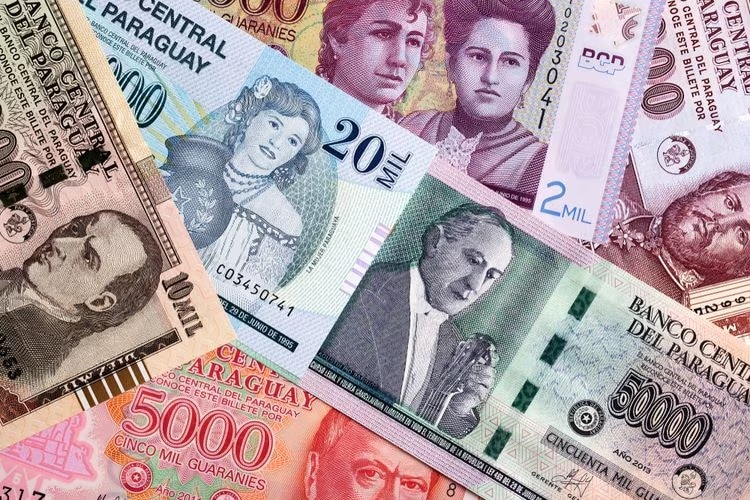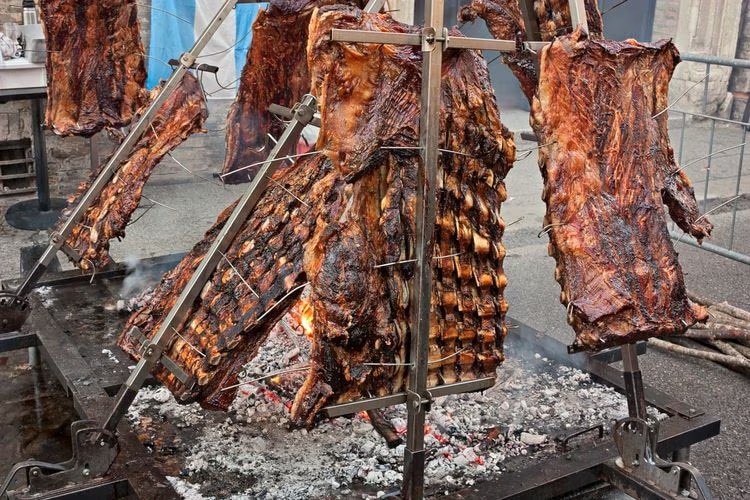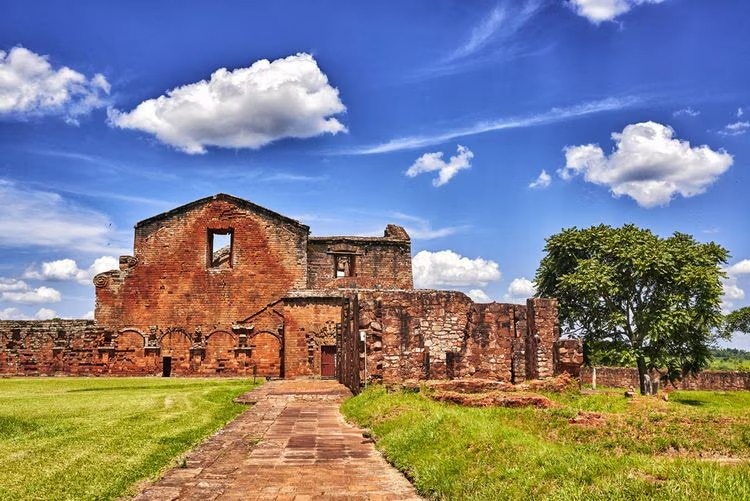Paraguay Travel Tips and Information
Official Name
Republic of Paraguay
Capital
Asunción
Population
Country Code
Around 6.95 million
PY
Country Code (international calls)
+595
The flight time to Paraguay is approximately ---- hours. Check the climate, currency, religion, manners, other information of Paraguay below. Wishing you pleasant travels to Paraguay.
Paraguay is situated in South America, surrounded by Brazil, Bolivia, and Argentina to the south. As a landlocked country, it is split into eastern and western regions by the Paraguay River.
Local Climate / Weather
Paraguay, located in the heart of South America, experiences a subtropical climate that offers diverse conditions throughout the year. Understanding Paraguay’s climate and planning travel accordingly can make your visit a memorable and comfortable experience. Paraguay’s climate is characterized by two main seasons: the warm, humid summer and the cooler, drier winter. The summer months, which run from November to March, often feature high temperatures averaging between 30°C to 40°C, especially in the northern Chaco region. The winter months, from May to August, are more moderate, with temperatures ranging from 13°C to 25°C. Rainfall is more frequent in the eastern regions, including Asunción, while the western Chaco sees drier conditions.
Currency & Tipping
Currency
When traveling to Paraguay, it’s important for travelers to understand the currency and tipping practices to make their experience smooth and enjoyable. The official currency in Paraguay is the Paraguayan Guarani (PYG). Travelers can find exchange services at major banks, currency exchange offices, and international airports. It is recommended to carry cash in small denominations, as smaller businesses and vendors often do not accept credit cards. ATMs are widely available in urban areas, but it's wise to ensure your card is compatible and inform your bank of international usage to avoid issues. Most major hotels and restaurants in larger cities accept credit cards, but in more rural areas, cash is essential.
Tipping
Tipping in Paraguay is appreciated but not mandatory. In restaurants, a tip of around 10% of the bill is considered generous. For hotel staff, such as bellhops and housekeeping, small tips of PYG 5,000 to 10,000 are appropriate. Taxi drivers do not generally expect tips, but rounding up the fare is a kind gesture. Understanding these currency and tipping practices helps travelers budget better and show appreciation for services while visiting Paraguay. These details ensure a seamless and respectful travel experience.
Useful Travel Information

Voltage & Electrical Outlets
Paraguay operates on a 220V supply voltage and 50Hz frequency. The standard plug types are Type C and Type F, which feature two round pins. Travelers should bring a universal travel adapter to ensure their devices can be safely used.

Internet Connectivity
Internet access in Paraguay is generally reliable in urban areas, with many hotels, cafes, and public spaces offering Wi-Fi. For those needing mobile data, local carriers such as Tigo, Claro, and Personal provide SIM cards with various prepaid data plans that are easy to activate and convenient for travelers. Purchasing a SIM card at the airport or at official stores is recommended for seamless connectivity.
Water for Consumption (Drinking Water)
It is advisable for travelers to avoid drinking tap water in Paraguay. Instead, opt for bottled water, which is widely available and affordable. Ensuring safe hydration is key to avoiding potential stomach issues and staying healthy throughout your stay.
Culture, Religion & Social Etiquette
Culture
Paraguay is a country rich in cultural heritage and traditions that blend indigenous and colonial influences. This unique fusion is deeply embedded in its vibrant folklore, music, and dance. Travelers will find Paraguay’s culture similar in its emphasis on community and strong family bonds. The traditional music, especially the sounds of the Paraguayan harp and polka rhythms, create an atmosphere of festivity and warmth that echoes the love for music. Paraguayan festivals, such as the Ovecha Rague Fair and the Nanduti Festival, showcase local crafts, foods, and dance, offering a lively experience of the nation’s artistic spirit. Paraguayans hold great respect for their traditions, evident in their attire, culinary customs, and national symbols. Indigenous Guaraní culture continues to be an integral part of Paraguayan identity, with the Guaraní language coexisting alongside Spanish as an official language. Travelers will appreciate the welcoming and hospitable nature of Paraguayans, who often greet strangers with a smile and warm exchanges.
Religion
Religion plays an essential role in Paraguayan society. The majority of the population identifies as Roman Catholic, making up approximately 90% of religious affiliations. This shared Catholic heritage means travelers will find many familiar practices, including the celebration of major religious events such as Christmas, Holy Week, and various saints’ feasts. Churches are not only places of worship but also important community centers where social and cultural activities are held. Protestant and evangelical denominations are also present in Paraguay, contributing to the country's religious diversity. Moreover, indigenous beliefs and practices still hold significance for some communities, adding a layer of spiritual diversity that may intrigue visitors. Respect for religious practices and observances is a common value, ensuring that travelers are greeted with understanding and openness during their stay.
Social Etiquette
Understanding manners and etiquette is key to enjoying and respecting Paraguayan social customs. Paraguayans value politeness and personal relationships, so warm greetings, typically accompanied by a handshake or a light kiss on the cheek, are the norm. This friendly approach resonates well with travelers, who are accustomed to warm, personal interactions. When addressing someone, it’s polite to use their title and last name, especially in formal settings. Gift-giving is appreciated in Paraguay, and small, thoughtful tokens are well-received, particularly when visiting someone’s home. Travelers will find it familiar that meals are seen as opportunities to strengthen family and social ties. When dining, it is polite to wait for the host to signal the start of the meal and to say “Buen provecho” (“Enjoy your meal”) before beginning to eat. Time in Paraguay is perceived more flexibly compared to the punctuality expectations in other countries. This relaxed attitude toward time, known as “Paraguayan time,” . Overall, respect, friendliness, and genuine interest in others are integral to Paraguayan manners, providing an inviting environment for travelers seeking cultural immersion.
Food Culture
Paraguay's food culture is an enticing blend of indigenous Guaraní traditions and Spanish influences, creating a culinary landscape that travelers would find both unique and intriguing. Paraguayan cuisine centers around hearty, flavorful dishes that showcase local ingredients such as maize, cassava, and beef. These staples are integral to traditional meals like “sopa paraguaya,” a rich cornbread known as the only “soup” in the world you can eat with your hands. This dish, often served at family gatherings and celebrations, embodies the warmth and communal spirit of Paraguayan dining. Street food in Paraguay offers an authentic taste of local flavors perfect for travelers seeking quick, delicious snacks. Popular choices include “empanadas,” which are crispy pastries filled with meat, cheese, or vegetables, and “chipa,” a chewy, cheesy bread made from cassava flour that’s ideal for breakfast or an afternoon snack. Food stalls often serve “mbeju,” a delightful pancake-like treat also made from cassava and cheese, which pairs excellently with cocido, a traditional tea drink infused with burnt sugar. For a complete dining experience, visitors should explore the vibrant food scene in Asunción, Paraguay’s capital, where modern restaurants blend traditional recipes with contemporary twists. Notable establishments such as “Lido Bar” are famed for their hearty Paraguayan dishes and welcoming atmosphere. Another must-visit is “Bolsi,” a popular spot that combines classic Paraguayan fare with international influences, perfect for those looking to sample a variety of flavors in one setting. Dining in Paraguay often reflects the importance of sharing and hospitality. Whether savoring a street-side chipa or enjoying a sit-down meal of asado (barbecue) with local families, travelers will find that Paraguayan cuisine offers a rich tapestry of tastes and experiences that are both comforting and adventurous. These culinary journeys can be enhanced by trying homemade tereré, a cold herbal tea that embodies the country's social and refreshing traditions. Indulging in Paraguay’s food culture promises an exploration full of warmth, unique flavors, and a sense of community that travelers will appreciate and remember.
Major Tourist Attractions & UNESCO World Heritage Sites
Major Tourist Attractions
Major tourist attractions in Paraguay include the Presidential Palace, Maca villages, and mausoleums. Cruises on the Paraguay River, which flows through the middle of the country, are also popular. There are many national parks and places that have been designated as nature reserves, so visitors can encounter a rich natural environment with a wealth of wild flora and fauna.
UNESCO World Heritage Sites
Paraguay's cultural heritage sites include La Santísima Trinidad de Parana and the Jesuit Missions of Jesús de Tabarlánge, which were registered in 1993.
Travel FAQs
Can English be commonly used in Paraguay?
English is rarely spoken in Paraguay. It is advisable to learn some basic Spanish for better communication.
What is the security situation in Paraguay? What precautions should I take?
Although Paraguay is one of the more stable countries in South America, it’s essential to take standard safety measures against pickpocketing and theft.
What is the most popular airport for traveling to Paraguay by plane?
The most popular option is "Silvio Pettirossi International Airport," which is located near the capital city, Asunción.
When is the best season to visit Paraguay?
The ideal season for visiting Paraguay is during its winter months, from May to August. Keep in mind that the country experiences significant temperature fluctuations, so appropriate clothing is necessary.




